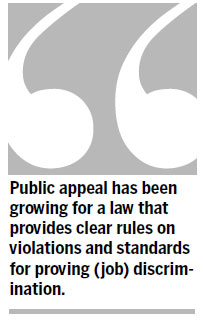Eliminating job discrimination is a tough task

Four years ago, emulating an Australian global competition for the "Best Job in the World," a lavender farm in Guangdong province launched a national search for two gardeners for the "The Best Jobs in China".
The requirements of Tourism and Events Queensland were simple: It wanted a caretaker for a local tropical island who could speak English, swim and blog. But the Guangdong advertisers required only "beautiful" women aged 18-25 and taller than 163 centimeters to apply to work on rolling lavender fields for a weekly salary of 20,000 yuan ($3,260). Candidates were also asked to specify their vital statistics and state "which part of your body you like the most" in the online applications.
The case shows how blatant and direct discrimination can be in China's job market. To understand how prevalent it is, one just needs to take a look at a recent directive of the Ministry of Education that bans universities from hosting recruitment exercises with discriminatory terms on gender, hukou (residency permit) and academic qualifications.









